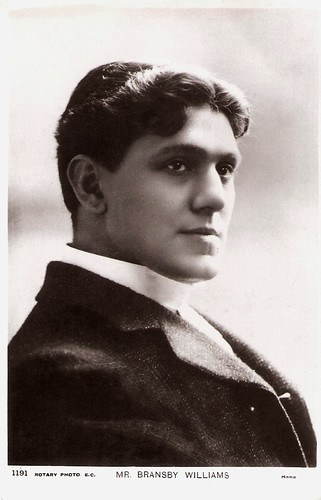
British postcard by Rotary Photo E.C., no. 1191. Photo: Hana.
A quick change artist
Bransby Williams was born Bransby William Pharez in London, England in 1870. His parents were William Meshech Pharez and Margaret Giles (née Booth).
He began his working life as a tea taster, clerk and designer of wallpapers. He appeared as an amateur actor before turning professional doing impersonations of Dan Leno, Gus Elen, and other music hall stars in working men's clubs.
His first appearance in a music hall was in 1896. In his music hall performances his specialism was as a quick change artist and mimic. He gave impersonations of the leading actors of that time, including Henry Irving in The Bells, Herbert Beerbohm Tree as Svengali from the popular play Trilby.
In 1897 Williams first created a variety of characters, including many from the works of Charles Dickens such as Uriah Heep, Bill Sikes and Fagin. In 1898 he appeared as Sydney Carton in The Noble Deed, based on A Tale of Two Cities at the Oxford Theatre.
Williams became a great success performing in monologues, recitations and sketches. A fine example of this is given in The Stage Door Keeper where Bransby uses the storyline to introduce a superb variety of artistes. In 1905 and 1907 he toured in the United States.
In 1911 he made his film debut in the short Royal England, a Story of an Empire's Throne (A.E. Coleby, Leo Stormont, 1911), a history of England's royalty, from Alfred the Great to Edward VII. In the following years he appeared in silent films like The Street Watchman's Story (Charles Vernon, 1914) and Bernardo's Confession (Charles Vernon, 1914).
He also played the lead opposite Ivy Close in Adam Bede (Maurice Elvey, 1918), based on a novel by George Eliot. Williams appeared in several adaptations of the novels by Charles Dickens, including The Adventures of Mr. Pickwick (Thomas Bentley, 1921) with Frederick Volpe as Samuel Pickwick. The film business was a side-line for Williams but his few silent films in the 1920s were very successful.
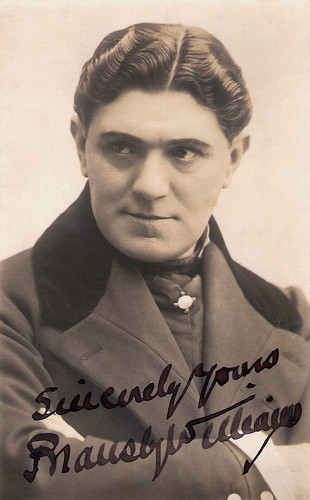
British postcard by Hana, London.
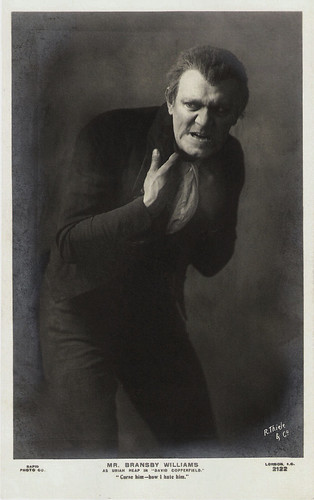
British postcard by Rapid Photo co., London, no. 3122 Photo: R. Thiele & Co.,. Publicity still for a stage production of David Copperfield. with Bransby Williams as Uriah Heep. Caption: "Curse him - how I hate him."
Blacklisted
Bransby Williams played Dickens’ Ebenezer Scrooge in the early sound film Scrooge (1928). This short film was the first talkie adaptation of any portion of A Christmas Carol, though it lasts only 9 minutes. It is now believed to be lost.
His impressive stage career came to an abrupt end in the early 1930s when he didn't keep to a five-year contract because of an accident of his wife. As a result he was blacklisted and hardly got work. Within no time he changed from one of the best paid actors to a man living near poverty.
In 1933, Williams had a supporting part in the musical comedy Soldiers of the King (Maurice Elvey, 1933) with Cicely Courtneidge and Edward Everett Horton. Williams played a horse and cart driver for the Local Authority in The Song of the Road (John Baxter, 1937).
During the war period, he was seen in the drama The Common Touch (John Baxter, 1941) with Greta Gynt, the comedy Those Kids from Town (Lance Comfort, 1942) and the war drama Tomorrow We Live (George King, 1943) with John Clements.
After the war, he returned as Ebenezer Scrooge in the TV film A Christmas Carol (1950). Later in his career Williams was a regular on radio and television. His final film role was in the crime drama Judgment Deferred (John Baxter, 1952).
Bransby Williams died in 1961 in London. Williams was married to Emilie Margaret Dent since 1892. He was survived by his daughters, Winnie, Ida and Betty, and by his son, the actor Eric Bransby Williams. His eldest son, Captain William George Bransby Williams, was killed during World War I. His body was never found.
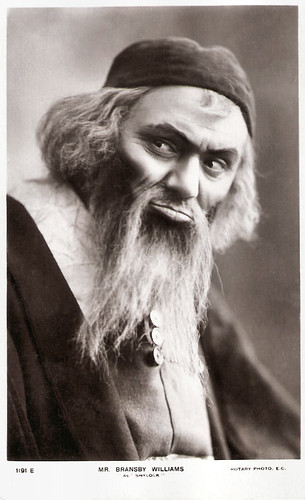
British postcard by Rotary Photo E.C., no. 1101 E. Photo: Bransby Williams as Shylock.
In his biography 'An actor's story', Bransby Williams described how he played Shylock, the character from William Shakespeare's The Merchant of Venice: "In Shylock I enter with the words, " There in Antonio I have another bad match," etc., and go through that speech to make it a complete sketch, and to get an exit I use sentences from other scenes. Thus, at the end of the above speech I speak, " And I tell thee — that if every ducat in six thousand ducats were in six parts and each part a ducat — I would have my bond — Antonio called me dog, before he had a cause — Well, as I am a dog, let him beware my fangs — I'll hear no more speaking — I'll have my bond — my bond, I swear ! " At this I make my exit, storming — so that I have used parts of other scenes to make a complete scene for presentation solus."
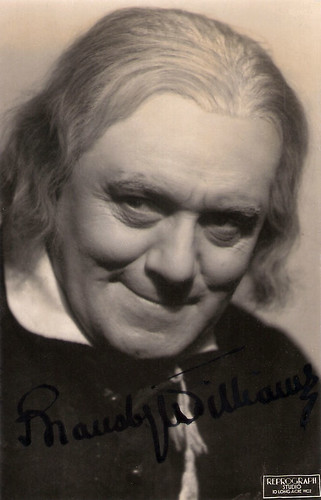
British postcard by Reprograph Studios, London.
Sources: Thomas Staedeli (Cyranos), Wikipedia, and IMDb.
No comments:
Post a Comment